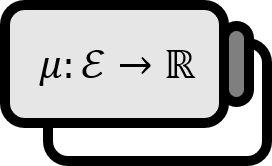Convergence in Measure
Definition 1
Suppose a measure space $( X , \mathcal{E} , \mu)$ is given.
- A sequence of measurable functions $\left\{ f_{n} : X \to \mathbb{R} \right\}_{n \in \mathbb{N}}$ is said to converge in measure to a measurable function $f : X \to \mathbb{R}$ if for all $M >0$ it satisfies the following. $$ \lim_{n \to \infty} \mu \left( \left\{ x \in X : | f_{n}(x) - f(x) | \ge M \right\} \right) = 0 $$
- A sequence $\left\{ f_{n} : X \to \mathbb{R} \right\}_{n \in \mathbb{N}}$ is called Cauchy in measure if for all $M >0$ it satisfies the following condition. $$ \lim_{n,m \to \infty} \mu \left( \left\{ x \in X : | f_{m}(x) - f_{n}(x) | \ge M \right\} \right) = 0 $$
Explanation
In terms of probability theory, this is referred to as convergence in probability.
The definition of convergence neatly encapsulates our understanding of convergence. However, using the concept of a measure to define a new type of convergence is necessary because this type of convergence can be quite complex. If one compromises such that $f_{n}$ becomes sufficiently similar to $f$ outside the region converging to $0$ when measured by $\mu$, then more can be discussed. This is similar to considering almost everywhere in measure theory.
Basic Properties
General Measure Spaces
- [1-1]: If $f_{n}$ converges to $f$ $\mathcal{L}_{p}$-ly, then it converges in measure.
- [1-2]: If $f_{n}$ converges uniformly to $f$ almost everywhere, then it converges in measure.
Finite Measure Spaces
Suppose $\mu$ is a finite measure.
- [2-1]: If $f_{n}$ converges uniformly to $f$, then it converges pointwise.
- [2-2]: If $f_{n}$ converges pointwise to $f$, then it converges almost everywhere.
- [2-3]: If $f_{n}$ converges almost everywhere to $f$, then it converges in measure.
Proof
Though the proofs of [2-1] and [2-2] don’t require assuming $\mu (X) < \infty$, the condition of a finite measure space is necessary to prove [2-3]. In summary, [2-1] to [2-3] state:
- Uniform convergence $\implies$ pointwise convergence $\implies$ almost everywhere convergence $\overset{\mu(X) < \infty}{\implies}$ measure convergence
This fact is especially significant for a probability space defined via measure $\left( \Omega , \mathcal{F}, P \right)$, where $P$ is defined as a finite measure $P (\Omega) = 1 < \infty$.
[1-1]
For $M > 0$ $$ \begin{align*} \int_{X} | f_{n} - f |^{p} d \mu &\ge \int_{\left\{ x \in X : | f_{n}(x) - f(x) | \ge M \right\}} |f_{n} - f |^{p} d \mu \\ &\ge \int_{\left\{ x \in X : | f_{n}(x) - f(x) | \ge M \right\}} M^{p} d \mu \\ &\ge M^{p} \mu \left( \left\{ x \in X : | f_{n}(x) - f(x) | \ge M \right\} \right) \end{align*} $$ Since $f_{n}$ converges to $f$ $\mathcal{L}_{p}$-ly, we have $\displaystyle \lim_{n \to \infty } \int_{X} | f_{n} - f |^{p} d \mu = 0$ and $M>0$. $$ \lim_{n \to \infty} \mu \left( \left\{ x \in X : | f_{n}(x) - f(x) | \ge M \right\} \right) = 0 $$ Thus, $f_{n}$ must converge to $f$ in measure.
■
[1-2] 2 3
Almost uniform convergence: Assume a measure space $( X , \mathcal{E} , \mu)$ is given.
- A sequence of measurable functions $\left\{ f_{n} \right\}_{n \in \mathbb{N}}$ is said to converge almost uniformly to a measurable function $f$, if for each $\delta > 0$ there exists an $E_{\delta} \in \mathcal{E}$ satisfying $\mu \left( E_{\delta} \right) < \delta$, such that $X \setminus E_{\delta}$ converges uniformly to $f$ at $f_{n}$.
- A sequence $f_{n}$ is called an almost uniformly Cauchy sequence if for each $\delta > 0$, there exists an $E_{\delta} \in \mathcal{E}$ satisfying $\mu \left( E_{\delta} \right) < \delta$, such that $X \setminus E_{\delta}$ converges uniformly to $f$.
The fact that $f_{n}$ converges almost uniformly to $f$ means that, excluding some $E \in \mathcal{E}$ satisfying $\mu ( E) = 0$, all function values $f_{n} (x)$ at all points $X$ converge to $f(x)$. However $M > 0$ is given, $$ \left\{ x \in X : | f_{n}(x) - f(x) | \ge M \right\} \subset E $$ and, according to the monotonicity of measure, always $$ \mu \left( \left\{ x \in X : | f_{n}(x) - f(x) | \ge M \right\} \right) \le \mu ( E ) = 0 $$ Thus, $f_{n}$ converges to $f$ in measure.
■
[2-1]
By the definition of uniform convergence, for all $x \in X$ and $\varepsilon > 0$, there exists an $N \in \mathbb{N}$ satisfying $n \ge N \implies |f_{n}(x) - f(x)| < \varepsilon$, indicating that $f_{n}$ converges pointwise to $f$.
■
[2-2]
The pointwise convergence of $f_{n}$ to $f$ implies that except for $E = \emptyset$, all function values $f_{n} (x)$ at points $X$ converge to $f(x)$. At this point $\mu ( \emptyset ) = 0$, $f_{n}$ converges almost everywhere to $f$.
■
[2-3]
Egorov’s Theorem: Given a measure space $( X , \mathcal{E} , \mu)$, assuming $\mu$ is a finite measure, a sequence of measurable functions $\left\{ f_{n} : X \to \mathbb{R} \right\}_{n \in \mathbb{N}}$ converges almost everywhere on $X$ to a measurable function $f$ implies that $f_{n}$ converges almost uniformly to $f$ and converges in measure.
This can be concluded by the corollary of Egorov’s Theorem.
■
See Also
- $\mathcal{L}_{p}$ Convergence $\implies$ Measure Convergence
- Almost Uniform Convergence $\implies$ Measure Convergence
- Egorov’s Theorem: Almost Everywhere Convergence $\overset{\mu(X) < \infty}{\implies}$ Measure Convergence
Bartle. (1995). The Elements of Integration and Lebesgue Measure: p69. ↩︎
Ramiro, Prove that if $(f_n)$ converges to $f$ almost uniformly then $(f_n)$ converges to $f$ in measure., URL (version: 2017-06-06): https://math.stackexchange.com/q/2311989 ↩︎
Bartle. (1995). The Elements of Integration and Lebesgue Measure: p74. ↩︎
